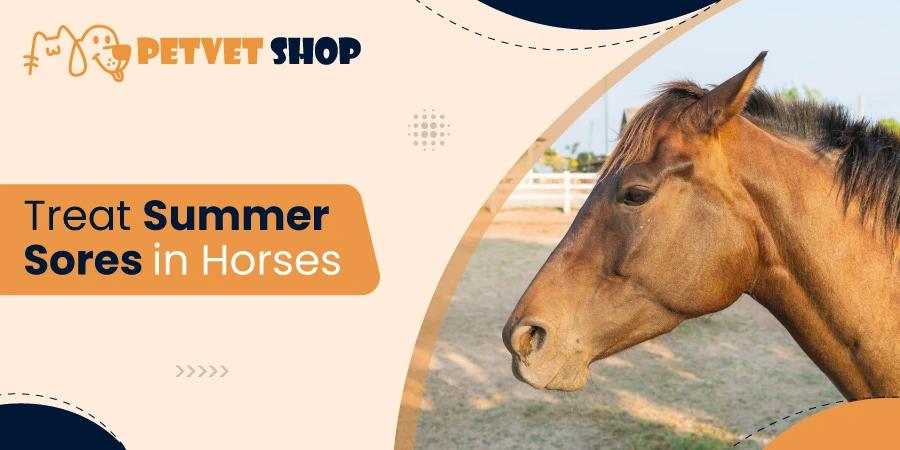Summer sores in horses, also known as habronemiasis, are a common and frustrating skin condition that affects many horses during the warmer months. Caused by the larvae of stomach worms like Habronema and Draschia, these sores often appear on existing wounds, around the eyes, mouth, or legs, leading to non-healing, inflamed lesions if left untreated.
In this guide, we’ll explore how to treat summer sores in horses, the most effective fly control methods, and the best deworming strategies to prevent recurrence. Whether you're dealing with a sore horse for the first time or looking for advanced treatments like cryotherapy or laser therapy, this blog will equip you with everything you need to know.
At PetVet Shop, we’re here to help you keep your horse healthy, comfortable, and summer sore-free with trusted products and expert care tips.
What Are Summer Sores in Horses?
Summer sores, medically known as Habronemiasis, occur when larvae of stomach worms (Habronema and Draschia) infect a horse’s skin.
This parasitic infection is more prevalent in the summer due to increased fly activity, hence the term "summer sores."
Adult worms shed eggs on pastures like all intestinal parasites via horse dung. The eggs hatch, and if luck is in their favor, they get ingested by the intermediate host that’s integral to the completion of the lifecycle – the maggots of the house and stable flies that are laid alongside them in the feces.
In the maturation process, the maggots develop into adult flies in which the worm larvae develop. They feed on secretions from the nose, mouth, eyes, under the belly, and any open wounds on the horse. Whenever the timing is right, the larvae jump ship and make their way around the mouth of the horse so that they can find their way back into the stomach to complete their life cycle.
The common symptoms of summer sores in horses include:
- Persistent itching
- Skin irritation
- Non-healing wounds
- Swelling around the sore
If left untreated, these sores can become severe, leading to discomfort and potential infection.
In the last few decades, summer sores have become extremely rare, so rare that veterinarians who graduated after that time may never have seen or known one, according to D. G. Pugh, DVM, a professor in the department of pathobiology at Auburn University College of Veterinary Medicine and director of the Alabama Department of Agriculture Veterinary Diagnostic Laboratory System.
How Do Summer Sores Develop?
The injury starts as a superficial scratch on your horse's pastern. Then you just cleaned it up without thinking much about it. But the cut didn’t heal; weeks later, it’s an oozing, festering mess. Your horse keeps biting and rubbing it, so you know it’s driving them nuts.
Common areas where summer sores have a chance to develop:
- Existing wounds
- Eyes
- Mouth
How to Treat Summer Sores in Horses
Providing quality treatment to animals is essential, just like for human beings, to relieve them of their suffering. Additionally, fair treatment mainly eradicates the problem; if not, controls it to a greater extent, and horses live the rest of their lives calmly.
Here’s a step-by-step approach:
- Clean the Affected Area
Use mild soap and water to clean the sore gently. Removing any debris can help reduce irritation and infection risk.
- Topical Medications
Apply topical ointments containing corticosteroids or ivermectin. These can help eliminate parasitic larvae and reduce inflammation.
- Administer Oral Dewormers
Treating the internal cause is crucial. Deworming medications such as moxidectin or ivermectin should be given to combat stomach worms and make horses comfortable in their regular activities.
- Control Fly Exposure
Use fly repellents and protective coverings to prevent further larvae from being deposited in wounds.
How to Treat Summer Sores in Horses
Treatment is essential to prevent further complications.
Here’s a step-by-step approach:
1. Surgical Debridement
- Surgical removal of dead or infected tissue.
- Reduces risk of infection.
- Accelerates the healing process.
- Prevents spread to surrounding areas.
- Requires post-surgical care to prevent reinfection.
- Promotes faster recovery.
2. Laser Therapy
- Targets deep layers of infected tissue.
- Stimulates healthy tissue growth.
- Reduces scarring.
- Non-invasive and minimally stressful.
- Effective for persistent sores.
- Improves long-term skin health and reduces relapse.
3. Cryotherapy - Widely Used Treatment for Summer Sores in Horses
- Reduces inflammation through freezing.
- Kills larvae and prevents further damage.
- Promotes new tissue growth.
- Minimizes pain during healing.
- Fast recovery with fewer complications.
- Reduces itching, making the horse more comfortable.
4. Immunomodulators
- Strengthens the horse’s immune response.
- Speeds up healing time.
- Reduces the chance of recurrence.
- Improves overall health and infection resistance.
- Often combined with other treatments.
- Helps prevent future parasitic infections.
5. Topical Medications
- Anti-parasitic ointments kill larvae.
- Corticosteroid creams reduce inflammation.
- Antibiotic ointments prevent infections.
- Fly-repellent creams protect sores.
- Requires consistent daily application.
- Easy and accessible for home care.
Prevention Tips for Summer Sore in Horses
While treating summer sores is crucial, preventing them can save you and your horse from discomfort.
Here are some practical steps:
- Maintain Fly Control
Use fly sprays, masks, and sheets to protect your horse. - Regular Deworming
Keep your horse on a regular deworming schedule to prevent larvae from causing infections. - Manage Wounds Properly
Treat any cuts or scrapes immediately with antiseptic solutions to reduce the risk of summer sore formation. - Stable Maintenance
Keep your barn clean by regularly removing manure and disposing of it far away from where your horses live and graze.
What Happens If Summer Sores Are Left Untreated?
If summer sores in horses are left untreated, several complications can occur:
- Chronic Sores
The wound may not heal, leading to chronic irritation and discomfort. - Infections
The open wound can become infected, leading to severe health issues. - Scarring
Prolonged sores can cause scarring, which may impact the horse’s skin flexibility and movement.
How to Treat Habronema: A Common Cause of Summer Sores
The Habronema parasite is a key cause of summer sores. Treating Habronema involves:
- Deworming Medications
Oral medications like ivermectin target the larvae inside the horse, preventing the sores from worsening. - Topical Antibiotics
These help control any secondary bacterial infections.
Effective Habronema treatment can prevent recurring sores and keep your horse comfortable throughout the summer.
Promoting Healing and Aftercare
Once your horse’s summer sores have been treated, follow these steps for proper aftercare:
- Monitor Wounds Daily
Check the affected area for any signs of infection or reopening.
- Continue Fly Control
Even during the healing phase, keep flies away to prevent reinfection.
- Consult a Vet for Recurring Sores
If the sores don’t heal or keep coming back, it’s best to consult a qualified equine veterinarian for specialized care.
At PetVet Shop, we’re more than just a pet store — we’re your one-stop pet care marketplace. From fly repellents and wound care to dewormers and grooming essentials, we offer everything your horse needs to stay healthy and comfortable all summer.
Explore our curated selection of equine care products and give your horse the relief they deserve — all in one place.
Wrapping Up!
Summer sores in horses are painful but preventable. You can protect your horse from discomfort and complications with the proper care, including regular deworming, fly control, and wound management.
PetVet Shop is here to support you every step of the way. Whether you need effective fly sprays, dewormers, or wound care products, we’ve got you covered.
Keep your horse healthy, happy, and summer sore-free with trusted products from PetVet Shop.
FAQs
How do I prevent my horse from getting summer sores?
Preventing summer sores involves a combination of fly control, proper wound care, and regular deworming. Using fly masks and repellents and keeping your horse’s environment clean can significantly reduce the risk of infection.
Can summer sores heal on their own?
In most cases, summer sores require medical treatment. Left untreated, they can worsen, become infected, and cause significant discomfort. Early intervention is key to a faster and smoother recovery.
What are the best treatments for horse summer sores?
The most effective treatments include:
- Topical anti-parasitic ointments
- Oral dewormers
- Fly control products
In more severe cases, surgical debridement, cryotherapy, or laser therapy may be recommended by a veterinarian.
You can find many of these treatment essentials at PetVet Shop — your trusted source for pet care


